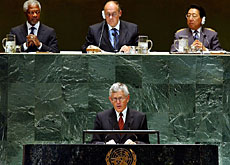Swiss keep faith with the UN

Five years after joining the United Nations, Switzerland remains an active member and supports the pragmatic approach of the new UN secretary-general.
But it is also aware of the UN’s lack of clout when faced with its more powerful members and the increasing ideological gap between richer and poorer countries.
“The UN, like other international organisations, is currently going through a difficult patch,” says Victor-Yves Ghebali, emeritus professor at the Graduate Institute of International Studies in Geneva.
This is a view shared by the Swiss government. “The divisions between member states are such that they often hamper the UN’s capacity to implement collective action for peace and security or to make progress in developing international law,” it noted in its 2007 report on Switzerland’s relations with the UN.
The report said that there was a division between the General Assembly, where developing countries could have their say, and the Security Council, whose permanent members had considerable decision-making power and could use their veto to block resolutions.
This was not the only problem. “The rift between the superpower United States and the other members of the UN, evident since the Iraq war in 2003, remained decisive throughout 2006, as did the emerging rivalry between the USA and China,” concluded the report.
Ghebali goes further. “This situation can’t change before the next US president is elected,” he said, adding that the situation could get worse if Washington decided to bomb Iran.
Russia has also been very much on the offensive, added the expert, notably having blocked moves to give Kosovo independence.
He also underlined China’s largely negative role in Darfur, in Sudan, but also noted that the country tended to keep a low international profile so as not to harm its economic prospects.
Status quo
According to Ghebali, the US, China and Russia are against an enlargement of the Security Council or the right to veto being abolished. Other large countries also want to keep the status quo, he added.
“The big powers try to keep their margin for manoeuvre and many smaller states don’t want any UN-sanctioned interference in their affairs,” said Ghebali.
This situation does not seem to worry Switzerland.
“[The government] considers the UN to be an indispensable instrument for safeguarding our country’s interests and for achieving our foreign policy objectives,” the report stated.
Bern said that the election of the new UN Secretary-General Ban Ki-moon in 2006 as a successor to Kofi Annan showed that the institution was capable of overcoming rifts. It also noted the South Korean’s new style and priorities.
New secretary-general
“Instead of talking about reforms, Ban Ki-moon stresses the need to build bridges, to restore confidence and to strengthen the UN’s institutional capacities,” wrote officials.
The report said that the new secretary-general was concentrating on the management of peace operations.
Another action area was disarmament – a domain in which Switzerland plans to increase its already substantial support.
The Swiss report approved of the greater emphasis on environmental and health issues.
The country will make its views known at the 62nd UN General Assembly, which opens next Tuesday.
“The agencies which deal with health, development or humanitarian issues, which are mostly based in Geneva, do good work,” said Ghebali, adding that they were hampered by small budgets.
Ghebali does not believe that the work of the UN, born from the ashes of two world wars, is slowly coming to an end.
“The UN is still standing 60 years after it was founded. This is a real feat, given the distrust of countries for this supranational body. But it could take another major global event to give it a new impulse.”
swissinfo, based on a French article by Frédéric Burnand
Switzerland supports human rights and improving the workings of the Security Council, which also includes the committees charged with administering sanctions.
It backs better UN internal management and control, sustainable development and conflict resolution. The country also wants to help implement a more coherent UN operational system.
… Switzerland, which is geopolitically isolated and does not belong to any major alliance, needs to work together with like-minded states in a variety of regions (generally with member states of the European Union or in groups formed by Canada, Australia and New Zealand, but also with moderate countries of South America, Asia and Africa) to initiate processes and develop ideas. It is only by gathering such a ‘critical mass’ for an initiative that Switzerland is able to influence important processes.
From the 2007 Switzerland and the UN report

In compliance with the JTI standards
More: SWI swissinfo.ch certified by the Journalism Trust Initiative












You can find an overview of ongoing debates with our journalists here . Please join us!
If you want to start a conversation about a topic raised in this article or want to report factual errors, email us at english@swissinfo.ch.